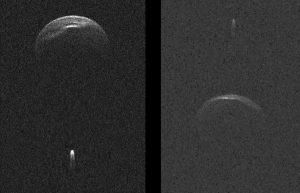
Radar images of double asteroid 1999 KW4, showing the main, mile-wide asteroid and its smaller companion. Image credit: Arecibo Observatory/NASA/NSF
A roundup of the month’s news from around the Solar System – and beyond. You don’t think of mars rovers having drawers, but that’s exactly what has just been installed on the Rosalind Franklin Rover, part of ESA’s ExoMars mission. This is no ordinary drawer, of course, but the “Analytical Laboratory Drawer”, designed to test martian soil for the presence of biomarkers or microfossils, either of which would indicate the presence of present or past life.
Closer to home, a mile-wide asteroid called 1999 KW4 has just whizzed past the Earth. It’s at a relatively safe distance – 13 Earth-Moon distances, or 5 million km, but it gives us a chance to study it in more detail – including its small moon! You can also take part in the observations, at LCO’s Asteroid Tracker (asteroidtracker.lco.global). The presence of a moon isn’t that unusual, with many small objects having companions – and not just in the inner Solar System. Further afield, we’ve just had the first official publication of the results from New Horizons spacecraft’s flyby of 2014 MU69, which seems to be the result of two smaller objects colliding very slowly.
Meanwhile, the search for gravitational waves goes on, with LIGO and Virgo now well into their third observing run. It’s early days, but they’re on track for having several dozen detections by the end of this run.
May 2019 marks the 10 year anniversary of the launch of the Herschel Space Observatory, ESA’s infrared space observatory that studied the formation of stars in our galaxy and beyond. We have the thoughts of four people who worked on the project: Prof Matt Griffin, Prof Haley Gomez, Dr Mattia Negrello and Dr Sarah Ragan. There’s also a special bonus episode dedicated to the Herschel’s legacy ten years after its launch.
An extended edition of an original broadcast on 30th May 2019 as part of Pythagoras’ Trousers on Radio Cardiff.





